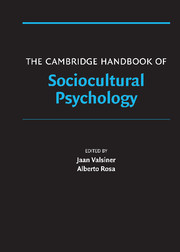Book contents
- The Cambridge Handbook of Sociocultural Psychology
- The Cambridge Handbook of Sociocultural Psychology
- Copyright page
- Contents
- Preface
- Contributors
- The Cambridge Handbook of Sociocultural Psychology
- Editors’ Introduction Contemporary Socio-Cultural Research
- Part I Theoretical and methodological issues
- Part II From nature to culture
- Part III From orientation to meaning
- Part IV Symbolic resources for the constitution of experience
- Part V From society to the person through culture
- Chapter 20 Apprenticeship in Conversation and Culture
- Chapter 21 The Creation of New Cultures in Peer Interaction
- Chapter 22 “Culture Has No Internal Territory”
- Chapter 23 Cultural-Historical Approaches to Designing for Development
- Chapter 24 Money as a Cultural Tool Mediating Personal Relationships
- Chapter 25 The Family
- Part VI From social culture to personal culture
- Part VII Making sense of the past for the future: memory and self-reflection
- General Conclusions: Socio-Cultural Psychology on the Move
- Index
Chapter 20 - Apprenticeship in Conversation and Culture
Emerging Sociability in Preschool Peer Talk
from Part V - From society to the person through culture
Published online by Cambridge University Press: 05 June 2012
- The Cambridge Handbook of Sociocultural Psychology
- The Cambridge Handbook of Sociocultural Psychology
- Copyright page
- Contents
- Preface
- Contributors
- The Cambridge Handbook of Sociocultural Psychology
- Editors’ Introduction Contemporary Socio-Cultural Research
- Part I Theoretical and methodological issues
- Part II From nature to culture
- Part III From orientation to meaning
- Part IV Symbolic resources for the constitution of experience
- Part V From society to the person through culture
- Chapter 20 Apprenticeship in Conversation and Culture
- Chapter 21 The Creation of New Cultures in Peer Interaction
- Chapter 22 “Culture Has No Internal Territory”
- Chapter 23 Cultural-Historical Approaches to Designing for Development
- Chapter 24 Money as a Cultural Tool Mediating Personal Relationships
- Chapter 25 The Family
- Part VI From social culture to personal culture
- Part VII Making sense of the past for the future: memory and self-reflection
- General Conclusions: Socio-Cultural Psychology on the Move
- Index
Summary
Keywords
- Type
- Chapter
- Information
- The Cambridge Handbook of Sociocultural Psychology , pp. 423 - 443Publisher: Cambridge University PressPrint publication year: 2007
- 12
- Cited by



